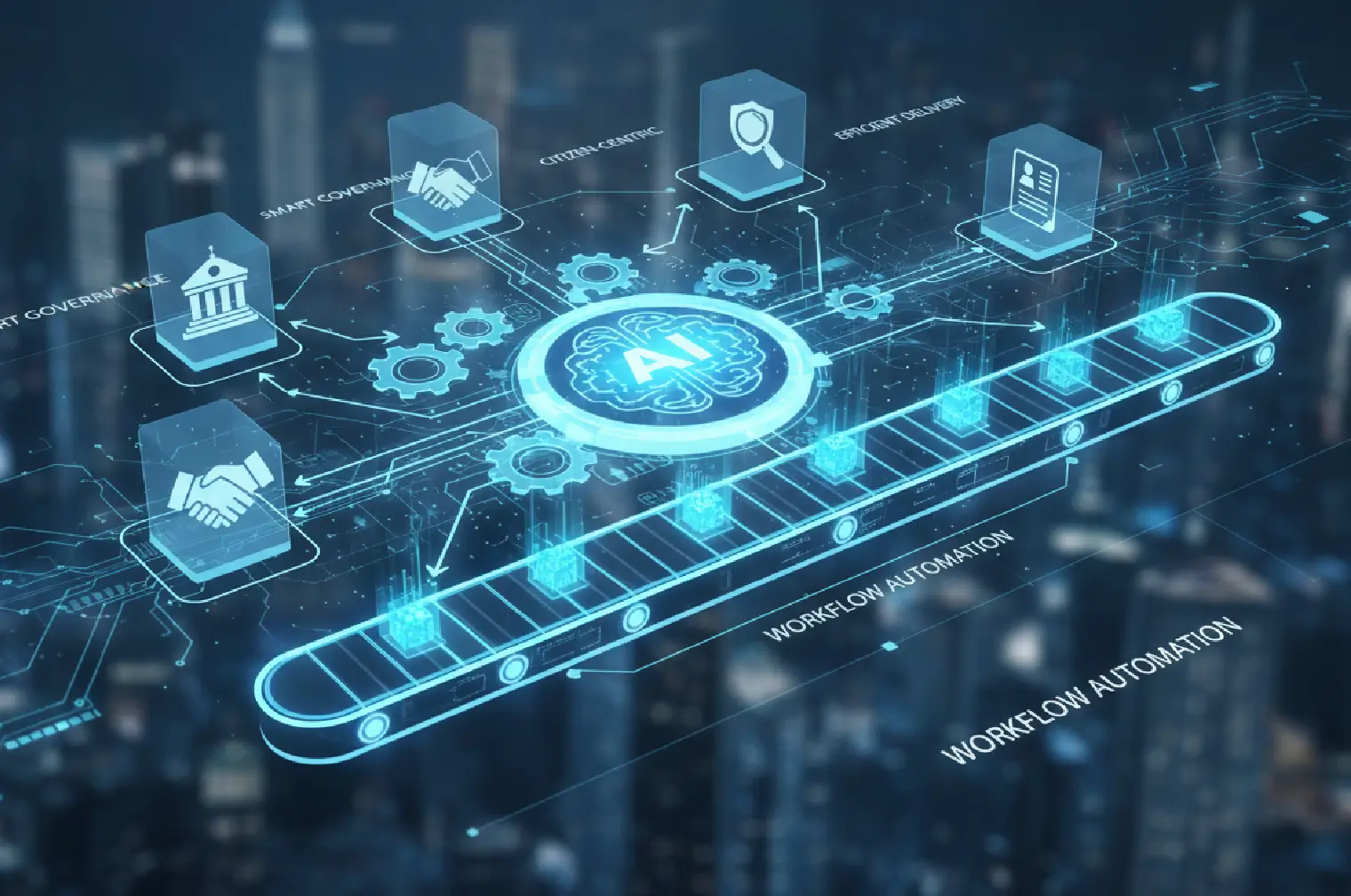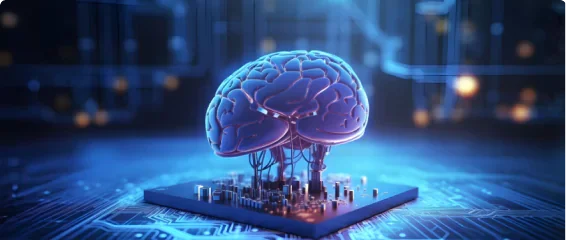Machine Learning and AI for revolution of Tech Companies are changing and streamlining businesses.
Government agencies worldwide face mounting pressure to deliver faster, more transparent, and cost-effective services, meeting the high expectations set by the private sector.
However, the ambitious goal of digital transformation in government is often hindered by deeply ingrained operational inefficiencies. Traditional government workflows frequently rely on outdated, paper-based, or manual systems that lead to lengthy processing times, inevitable human errors, and a fragmented flow of information across departments.
AI workflow automation offers a powerful solution by eliminating repetitive tasks, integrating disjointed systems, and using intelligent decision-making to streamline processes. This technology helps agencies transition from slow, rule-based systems to innovative, self-tuning platforms capable of managing complex, dynamic workflows.
Let’s discuss:
- The practical function and value of AI workflow automation in the public sector.
- The core benefits of AI-driven automation for citizen services.
- Specific public sector functions that gain the most efficiency from AI.
- The role of custom AI solutions in enabling smarter governance.
What Is AI Workflow Automation and Why Does It Matter for the Public Sector?
AI workflow automation refers to the digitization and orchestration of tasks, documents, and decisions within public sector operations, replacing manual intervention with sophisticated technology.
Unlike rudimentary rule-based automation focused solely on simple tasks like data entry, modern automation utilizes a comprehensive AI automation platform that embeds artificial intelligence technologies such as machine learning (ML), natural language processing (NLP), and predictive analytics. This approach is often referred to as intelligent automation (IA) or intelligent business automation.
For the public sector, this shift matters immensely because it enables government institutions to offer superior services, significantly reduce operating costs, and optimize internal processes.
By leveraging an AI automation platform, government agencies can automate entire complex processes, such as processing applications for grants or citizenship, which historically involved extensive manual effort. This capability is critical to achieving a sustainable future where public administration is both agile and proactive in responding to a digitally demanding citizenry.
Reimagine Public Service Delivery with AI Workflow Automation
Empower departments to deliver faster, data-driven outcomes using ViitorCloud’s AI workflow automation for the public sector.
How Can AI Transform Government Service Delivery and Operations?
AI in public sector operations transforms service delivery by moving government agencies beyond merely automating simple tasks toward integrating sophisticated decision-making capabilities. This enhancement empowers staff to concentrate on strategic priorities rather than mundane, repetitive work.
By applying automation with AI, governments can analyze large volumes of data quickly to make decisions wisely and accelerate bureaucratic approvals without compromising transparency or security. AI-powered systems excel at handling unstructured data, such as emails or documents, converting them into actionable insights—a critical function for extracting necessary information from multiple sources during complex decision-making processes.
This capability allows agencies to re-engineer core processes, such as permit processing and business registration, which formerly took weeks but can now be completed in minutes. Furthermore, AI facilitates a vital strategic pivot, enabling governments to transition from reactive responses to proactive governance by anticipating problems and future service needs, such as forecasting epidemic outbreaks or predicting infrastructure requirements.
What Are the Core Benefits of AI-Driven Automation for Citizen Services?
The benefits of AI in the public sector deployment are many.
Improved Operational Efficiency is paramount, as automating repetitive, rule-based processes drastically reduces processing times; for instance, loan processing times can shrink from days to hours.
Cost Reduction is achieved by minimizing manual labor, decreasing administrative errors, reducing the need for rework, and optimizing resource allocation—all crucial for governments operating with limited budgets. Beyond efficiency, AI-driven workflows enhance Accuracy and Compliance by consistently validating data inputs and embedding compliance checks directly into every step of a process.
This provides clear audit logs, helping governments meet strict regulatory requirements and simplifying audit processes. Ultimately, these benefits culminate in Improved Citizen Experience, providing quicker processing for documents like passports, faster resolution of requests, real-time status tracking, and 24/7 self-service options, which contribute to greater public trust and accountability.
Which Public Sector Functions Gain Most from AI Workflow Automation?
AI in government is not limited to a single department; rather, its widespread application streamlines diverse functions across federal, state, and local levels.
Key areas that realize substantial benefits from AI workflow automation include:
- Citizen Engagement and Support: Chatbot services for governments provide immediate, consistent, 24/7 support, answering frequently asked questions, guiding users through complex forms, and reducing wait times. This self-service capability frees up public employees from routine inquiries, allowing them to focus on high-impact initiatives.
- Case Management and Eligibility: Intelligent automation (IA) can process complex applications for grants or social services by verifying eligibility, flagging anomalies for fraud detection, and coordinating actions across multiple agencies in real time.
- Regulatory and Administrative Processes: Utilizing robotic process automation (RPA), governments can automate the management of business registration, tax processing, and operating licenses, eliminating bureaucracy.
- Public Safety and Health: Machine learning (ML) systems enable the anticipation of problems, such as identifying areas with higher crime rates or predicting epidemic outbreaks, leading to more efficient resource allocation and preventive planning.
- Logistics and Resource Management: AI-powered fleet management software optimizes routes for public transportation or waste collection, saving time and fuel while planning predictive maintenance for critical vehicles.
Check: Transform government operations with ViitorCloud’s AI Services
Transform Governance with Custom AI Solutions
Modernize public infrastructure and streamline operations with ViitorCloud’s custom AI solutions for government services.
How Do Custom AI Solutions Enable Smarter Governance?
While off-the-shelf automation platforms offer standardized efficiency gains, custom AI solutions are essential for achieving truly smarter governance and personalized public service delivery. Government workflows are often unique, requiring systems to integrate with legacy technology, adhere to specific jurisdictional compliance frameworks, or handle proprietary data sets.
Custom AI solutions for government services allow agencies to implement sophisticated technologies tailored precisely to their needs. For instance, machine learning models can be custom-trained on historical agency data to improve predictive analytics for highly specific public health or fiscal oversight domains. Furthermore, generative AI can be customized to draft official documents or generate code for legacy modernization, enabling greater efficiency with human-level criteria.
By focusing on creating bespoke applications, providers like ViitorCloud can develop custom AI solutions that manage complex inter-agency case management, address highly nuanced regulatory requirements, and ensure seamless integration across fragmented data silos, thereby driving deeper and more reliable digital transformation. This personalized approach ensures AI systems are not only efficient but also contextually relevant and trustworthy.
Use Cases of AI in Public Sector Workflows
The implementation of AI in public sector workflows demonstrates a growing commitment to operational excellence:
- Generative AI in Document Creation: Generative AI is used to create content, draft official documents, and summarize long texts, significantly accelerating repetitive administrative tasks while empowering public servants to focus on critical judgment.
- Intelligent Automation in Licensing and Permits: Local governments have automated the processing of operating licenses and business registrations, turning processes that once required days or weeks into tasks completed in minutes.
- Machine Learning for Risk Detection: Tax agencies utilize machine learning to analyze financial behavior and predict the risk of tax evasion, while health departments use similar methods to anticipate epidemic outbreaks, optimizing resource allocation.
- Chatbots for Citizen Interaction: Public-facing chatbots and virtual assistants, which are core components of AI workflow automation, provide immediate responses to queries regarding document renewals, utility payments, or enrollment in social programs 24/7. For example, the city of Helsinki deployed virtual assistants to help busy employees answer constituent questions quickly and accurately.
- Document Digitization (OCR): Optical character recognition (OCR) technology helps government agencies digitize historic and legal documents, such as those at the Library of Congress, creating searchable databases and redundant backups.
- Fleet Management Optimization: AI-powered software optimizes routes for services like garbage collection based on traffic and population density, reducing costs and consumption while scheduling predictive maintenance for municipal vehicles.
What Challenges Exist in Deploying AI for Government Services and How to Overcome Them?
While the promise of AI for government services is vast, adoption is fraught with unique challenges that policy leaders and digital transformation advisors must proactively address.
- Legacy System Integration: Many public agencies run on complex, outdated IT systems that struggle to interoperate with modern AI solutions. This must be overcome by selecting robust AI automation platforms that offer strong integration capabilities (APIs, connectors) to create cohesive workflows, even with legacy infrastructure.
- Ethical Risks and Algorithmic Bias: AI models can inherit human biases present in historical data, potentially perpetuating discrimination or generating misinformation. Overcoming this requires the establishment of trustworthy AI governance, clear safety guardrails, and policies to ensure transparency, privacy, and equity in deployment.
- Data Security and Privacy: Handling sensitive citizen data (e.g., health records, SSNs) necessitates high levels of security and compliance with stringent regulations (e.g., FISMA, HIPAA). Government agencies must invest in secure, scalable infrastructure and clear governance to mitigate data breach risks.
- Workforce Adaptation and Skills Gaps: Resistance to change and a lack of necessary AI competencies among staff can hinder successful deployment. This challenge is best mitigated through inclusive change management strategies, upskilling employees to work alongside AI tools, and prioritizing hybrid models where AI augments human decision-making.
Deploy AI-Driven Automation for Smarter Citizen Services
Streamline public workflows, enhance transparency, and boost efficiency with ViitorCloud’s AI-driven automation for citizen services.
How ViitorCloud Helps Governments Reimagine Service Delivery with AI Workflow Automation
The path to fully realizing the benefits of digital transformation in government requires strategic partnerships and an intelligent approach to technology implementation. ViitorCloud, as a trusted provider of AI workflow automation and custom AI solutions, specializes in helping government institutions modernize their complex operations. We understand that moving toward an agile, citizen-centric government is an operational necessity.
ViitorCloud helps agencies deploy a comprehensive AI automation platform that is adaptable, secure, and focused on delivering sustainable success. By leveraging our expertise in developing custom AI solutions for government services, we empower leaders to integrate AI securely across silos, eliminating bottlenecks in areas ranging from regulatory compliance and case management to procurement and citizen support.
Whether you need to streamline manual processes, implement predictive analytics, or deploy advanced chatbots, ViitorCloud offers the tailored technology and ethical guidance necessary to increase public trust, realize substantial cost savings, and define the future of public service delivery.
Contact ViitorCloud for a personalized consultation and explore how our custom AI solutions can help you reimagine service delivery and achieve relentless efficiency.









